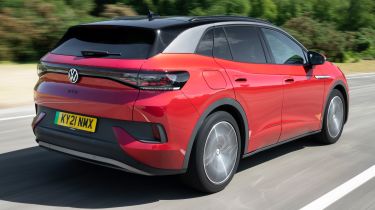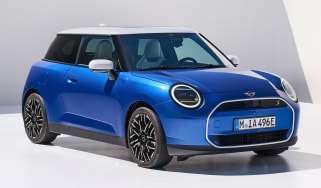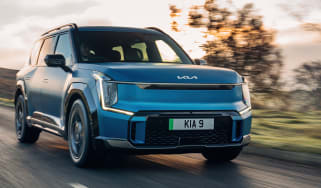Toyota bZ4X vs Hyundai Ioniq 5 vs Volkswagen ID.4: performance and handling
None are sports cars, which is fine for the bZ4X and Ioniq 5 but disappointing for the ID.4 with its GTX badge

Out of these three cars, the Volkswagen ID.4 is the only one yet to get a range-topping performance variant – although an Ioniq 5 N is coming later on. The ID.4 GTX is meant to be a glimpse of VW’s next-generation hot models; an electric version of its GTI cars that typically excite enthusiasts. In reality, the GTX is hamstrung by its badge, because it certainly doesn’t produce the driving thrills you might be expecting.
Part of the problem is its weight. The ID.4 isn’t a light thing at over two tonnes, and you can feel the effect of that through corners. Body roll is actually kept in check pretty well considering the weight, but another issue is that the steering is much lighter than it should be. With the steering also being quite numb and uninvolving, you end up feeling detached. In many respects, it’s little different from a regular ID.4. A Ford Mustang Mach-E is a far better choice if this is important to you.
Keen drivers may even get slightly more engagement out of the Toyota bZ4X. Its eTNGA platform is an electric version of what underpins the Toyota RAV4, so there are plenty of similarities between the two Toyota mid-size SUVs. The weight of the steering is better judged, and the bZ4X is marginally more comfortable than the ID.4 and the Hyundai Ioniq 5. It’s especially impressive on the motorway. It’s a relaxing cruiser with road and wind noise being kept well at bay.
Given its shared development with Subaru, the four-wheel-drive system in the bZ4X is a little more off-road focused than the others. We didn’t get a chance to test the rough-road mode, but the likelihood is that many owners won’t use it very often. The bZ4X doesn’t have particularly good ground clearance, so it won’t rival a proper off-roader when the tarmac runs out.
Toyota’s electric SUV has the least powerful motors here; its 228bhp trails the 295bhp VW and the 321bhp Hyundai by quite some way. That’s reflected in the acceleration times. Zero-to-62mph takes 6.9 seconds in the bZ4X, 6.2 in the ID.4 GTX and a mere 5.1 seconds in the punchy Ioniq 5, but in truth even the Toyota feels plenty quick enough for a car like this. All three feel quickest at low speeds, before their acceleration tails off slightly at higher velocities.
The Ioniq 5 doesn’t get a sporty badge and isn’t as expensive as the ID.4, but its superior acceleration is addictive. There’s no fuss, you’re just suddenly a lot further down the road than a few seconds previously. Besides the rapid pick-up of speed, the Hyundai certainly favours a comfortable ride over a sporty demeanour. Arguably, it’s better for it, and the Ioniq 5 is very accomplished on the motorway. It slightly trails the bZ4X on smaller, bumpier roads, but the difference is small.



